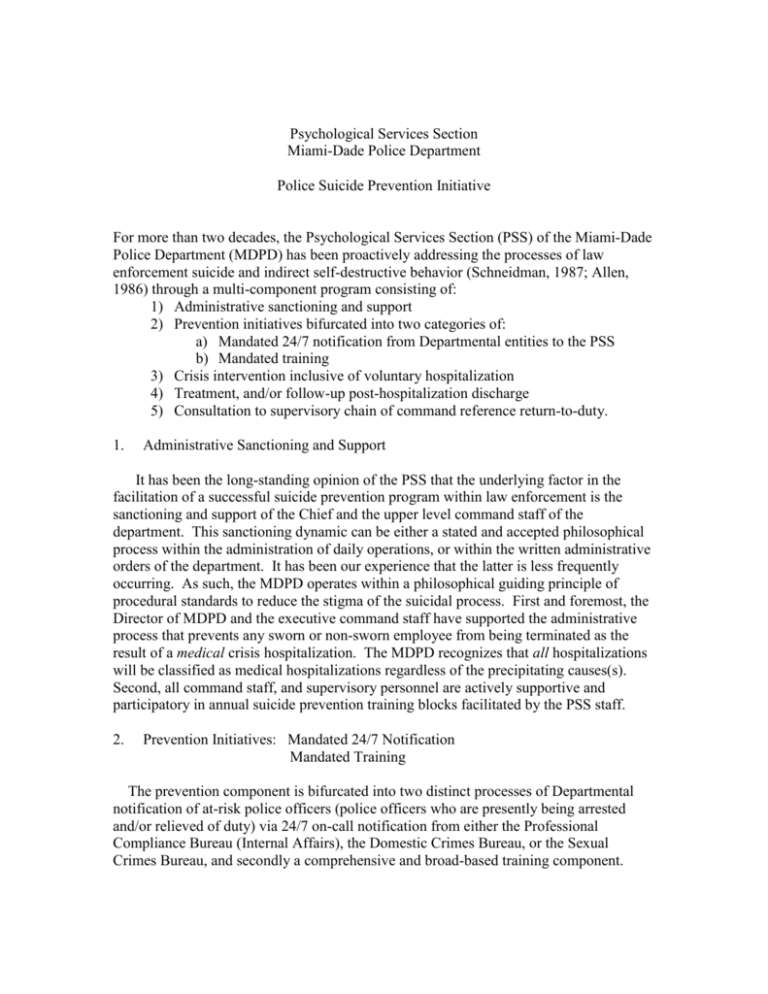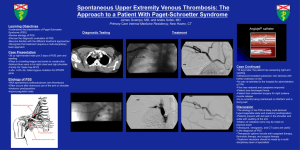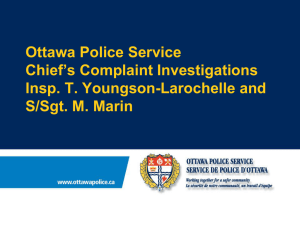
Psychological Services Section
Miami-Dade Police Department
Police Suicide Prevention Initiative
For more than two decades, the Psychological Services Section (PSS) of the Miami-Dade
Police Department (MDPD) has been proactively addressing the processes of law
enforcement suicide and indirect self-destructive behavior (Schneidman, 1987; Allen,
1986) through a multi-component program consisting of:
1) Administrative sanctioning and support
2) Prevention initiatives bifurcated into two categories of:
a) Mandated 24/7 notification from Departmental entities to the PSS
b) Mandated training
3) Crisis intervention inclusive of voluntary hospitalization
4) Treatment, and/or follow-up post-hospitalization discharge
5) Consultation to supervisory chain of command reference return-to-duty.
1.
Administrative Sanctioning and Support
It has been the long-standing opinion of the PSS that the underlying factor in the
facilitation of a successful suicide prevention program within law enforcement is the
sanctioning and support of the Chief and the upper level command staff of the
department. This sanctioning dynamic can be either a stated and accepted philosophical
process within the administration of daily operations, or within the written administrative
orders of the department. It has been our experience that the latter is less frequently
occurring. As such, the MDPD operates within a philosophical guiding principle of
procedural standards to reduce the stigma of the suicidal process. First and foremost, the
Director of MDPD and the executive command staff have supported the administrative
process that prevents any sworn or non-sworn employee from being terminated as the
result of a medical crisis hospitalization. The MDPD recognizes that all hospitalizations
will be classified as medical hospitalizations regardless of the precipitating causes(s).
Second, all command staff, and supervisory personnel are actively supportive and
participatory in annual suicide prevention training blocks facilitated by the PSS staff.
2.
Prevention Initiatives: Mandated 24/7 Notification
Mandated Training
The prevention component is bifurcated into two distinct processes of Departmental
notification of at-risk police officers (police officers who are presently being arrested
and/or relieved of duty) via 24/7 on-call notification from either the Professional
Compliance Bureau (Internal Affairs), the Domestic Crimes Bureau, or the Sexual
Crimes Bureau, and secondly a comprehensive and broad-based training component.
From the inception of its suicide prevention program, the PSS has conceptualized suicide
as a problem solving behavior. Specifically within law enforcement, this problem
solving behavior is most often of rapid onset aimed at the preservation of a threatened
self-image. A police officer rapidly cycles from embarrassment to humiliation and
suicide is seen as a means to avoid the loss of identity as a police officer. Thus, the PSS
has established a system of notification on a 24/7 basis in which the Departmental entity
is tasked with either the arrest or relief of duty of said police officer will as soon as is
appropriate, notify the PSS staff either directly or via the Communications Bureau Shift
Commander to respond immediately to the location of that affected police officer.
Typically, the entities involved are individual districts and bureaus, the Professional
Compliance Bureau, the Domestic Crimes Bureau, and the Sexual Crimes Bureau. The
PSS consistently communicates with the command staffs of these entities to re-emphasize
the importance of this call-out procedure. Once notified, one or two members of the PSS
staff will respond and initiate a suicide risk assessment of the police officer. If the police
officer is found to be at risk, the receiving jail facility will be notified and risk
precautions will be immediately established. If the police officer is found to be presently
not at risk, family members and/or established friends will be contacted to meet the
affected police officer upon his/her release from jail to establish direct, supportive
contact. Such direct contact with family and/or friends is critical in the short-term
intervention to prevent any suicidal actions.
The second prong of the prevention initiative is the facilitation of training blocks within
the MDPD (see course syllabus). These training blocks have a duration of 30-60
minutes and are mandated for all Departmental sworn officers inclusive of; Police Officer
Trainees at the Departmental Training Academy, every in-service training block
(regardless of the overall topical area to be presented) facilitated by the PSS, annual inservice training, all First Line Supervision training, and command staff annual training.
The content of all training blocks are nearly identical except for the focus of the
presentation which is directed toward the positional status of the attendees within the
Departmental organizational structure. The emphasis of the training is upon core
philosophical and intervention concepts. The initial core philosophical dynamic to be
discussed is the Departmental position that no employee will be at risk of losing their job
if they are hospitalized under a medical crisis hospitalization. A second core concept is
that suicide is a problem-solving behavior typically aimed at the preservation of a
threatened self-image (concept of embarrassment and humiliation). A final overview
point within this section is the production of a metaphorical comparison of suicide
intervention with a police officer as nearly identical to an “officer needs assistance”
backup response when working on road patrol. The training block didactic content
consists of the dynamics of suicide, the 10 commonalities of suicide (Schneidman, 1985,
1986, 1990b), suicide risk variables, clinical correlates of suicide, the deadly impact of
utilizing euphemisms, the suicidal paradox, the differences between suicide attempters
and suicide completers, effective strategies to incorporate with at-risk police officers,
and finally the various Departmental interventions procedures to utilize with at-risk
police officers (inclusive of PSS involvement).
3.
Crisis Intervention
The third component is crisis response, inclusive of voluntary hospitalization in most
most cases. As previously articulated, the PSS staff is on-call 24/7 for any Departmental
crisis response. Upon notification from a Departmental entity, the Communications
Bureau Shift Commander, family member or friend, or the actual affected employee, the
PSS on-call staff member will directly respond to the police officer’s location and initiate
a suicide assessment and disposition. Once again, as previously stated, if the police
officer is to be hospitalized, the PSS always endeavors to facilitate a voluntary medical
crisis hospitalization. Such a hospitalization will invariably reduce the extent of
stigmatization for the police officer.
4.
Treatment, Referral, and/or Follow/Up
The final component within the PSS suicide intervention program is direct treatment,
referral, or follow-up following the police officer’s hospital discharge. The PSS is not an
employee assistance program (EAP) but rather an in-house provider of direct clinical
services. As such, every employee within MDPD possesses an option to receive
voluntary clinical services at no charge at the PSS, or be provided external referrals from
the PSS staff. Typically, following a suicide crisis stabilization event, most police
officers seek services within the PSS. The PSS staff member will then initiate an overall
assessment of the client to determine the presence and severity of other co-occurring
disorders, most notably, substance abuse and/or pathological gambling. The PSS has the
capability to assess, refer, and provide follow-up care (inclusive of a long term support
group of law enforcement officers from MDPD, local municipal police departments, and
Federal agencies). Further, the PSS provides all assessment and treatment for those
police officers presenting with co-occurring pathological gambling.
5.
Consultation to Supervisory Chain Reference Return to Duty
In most cases of a crisis hospitalization, the PSS staff views such an event as a brief,
albeit intense, reactive set of behaviors by the police officer. As such, following
intensive short-term therapy aimed at changing belief systems and methods of problemsolving behaviors, the police officer is typically recommended to return to full-duty
status. If there is evidence of other co-occurring symtomatology, most typically, a
serious affective disorder, substance abuse, or pathological gambling, the PSS staff
member will recommend further therapy, and perhaps, light duty/desk duty. In rare
situations, the police officer may be exhibiting such extreme symtomatology, that a
mandatory fitness-for-duty evaluation may be recommended. However, it should be
emphasized that this disposition is rarely proffered by the PSS.








